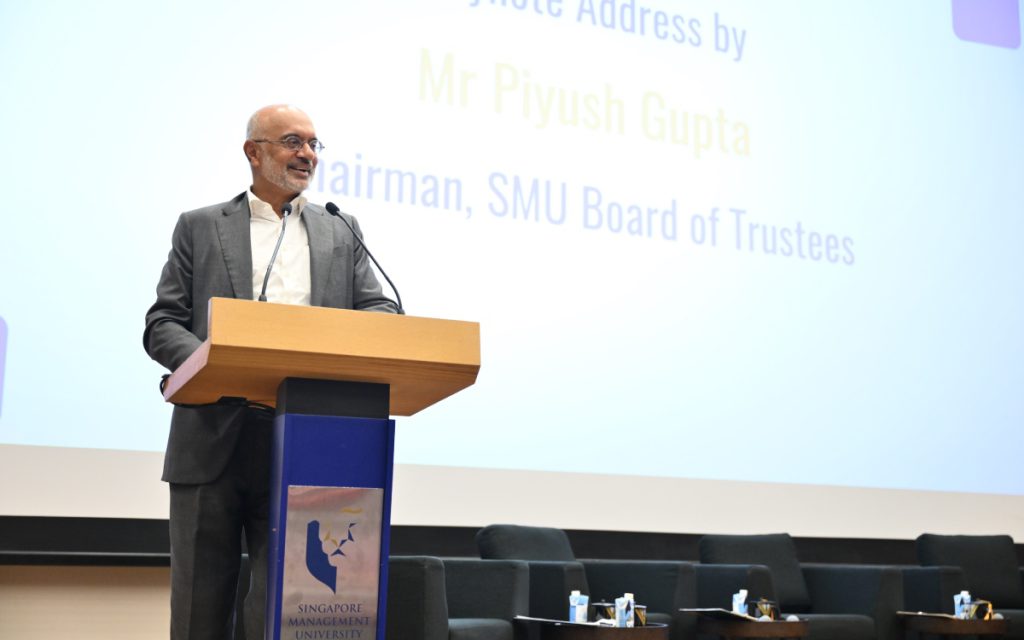DBS CEO Piyush Gupta is a man of action—he’s all about hands-on execution when it comes to his leadership style.
“There’s a proverb that says, leadership is about doing the right things, and management is about doing things right—I don’t believe that.”
To Gupta, leadership is about constantly adapting to market changes, and “rolling up your sleeves and getting into the weeds” when necessary.
At the Singapore Fintech Festival yesterday (November 7), the CEO reflected on his 15-year journey at the helm of Singapore’s largest lender, and spoke to Sopnendu Mohanty, the Chief Fintech Officer of the Monetary Authority of Singapore (MAS), about some of the key takeaways from his time leading the bank.
Creating a “culture of entrepreneurship”
Gupta is widely credited for driving DBS’ digital transformation—during his time as CEO, the bank doubled down on developing tech systems that reshaped much of the bank’s operations.
When DBS set out on its digital journey in 2014, it tried to “embrace some of the main macrotrends” in the fintech landscape, said the 64-year-old back in a 2017 interview with McKinsey senior partner Joydeep Sengupta.
“The DBS board took the view that the future for us and for our industry would have to be digital. We felt that if we didn’t lead the charge, frankly, we might die.”

The same year DBS began digitalising its operations, it launched the PayLah! mobile wallet, followed by other milestones, including the launch of a digital exchange, and the elimination of physical tokens for corporate transactions.
At the root of it all, Gupta attributes the bank’s success to its culture. Quoting management consultant Peter Drucker (popularly known as the “father of management”), he said that “culture eats strategy for breakfast”.
Over the years, I have come to realise the truth of that. If you only use analytics, strategy, thinking, you can direct—you can run a command, control organisation. You can get people to operate in a particular way, but it is limited.
Piyush Gupta, CEO of DBS
Within DBS, the CEO has strived to create a “culture of entrepreneurship”. As he puts it, “if you can create a culture of entrepreneurship and risk-taking, then it’s like magic.”
Reflecting on his past decisions, Gupta recalled initially opposing the implementation of PayLah! as he thought that a mobile wallet was “superfluous” and that people could just debit funds directly from their bank accounts.
After being persuaded by his staff though, the platform has now grown to nearly three million users. “So we do have situations [like this], where people have the capacity to be able to push the dynamics,” he added.
Pushing past setbacks

Innovation is essential for growth, but that’s what makes it risky. In recent years, DBS has encountered digital disruptions, including a two-day outage in its banking services in November 2021.
Reflecting on the bank’s digital capabilities, Gupta admitted, “I did not actually think enough, and hard enough, about the operational complexity that comes with a distributed microservice architecture.”
This architecture is commonly used for banking applications to provide fast, and reliable online services to customers. “The challenge is to enhance resiliency while advancing innovation and speed. If I were to do it again, I’d take a different approach.”
Gupta’s faced his fair share of setbacks, even on a personal level—yet, it was these very moments that were essential to his professional growth.
Before joining DBS, he spent 27 years at Citi, with a brief one-year break in 2000 to try his hand as a tech entrepreneur. As the internet boom surged, he launched Go41.com, only to shut it down within months when the dot-com bubble burst.
I pulled the plug on that venture within seven or eight months. And in truth, when I went through the process, it was challenging. I left a very thriving, flourishing career, and you know, apart from the loss of face, it was also [a loss of] self confidence.
Piyush Gupta, CEO of DBS
He struggled with his mental health, battling acute anxiety for a year. “I was 40 years old, and it took me time to find myself”.
Despite this, he described the experience as a “defining moment” for him—it changed his appetite for risk. “Once you’ve seen the bottom of the barrel, you get to think, how much worse can it get? It can’t get much worse than you’ve seen already.”
The incident had also profoundly impacted his career trajectory. His aspirations, prior to setting up Go41.com, was more so about climbing the corporate ladder: How could he get promoted? How could he move on the “fast track” and become a managing director?
But when he returned to banking, his perspective had shifted. For the first time, he thought about how he could make a meaningful impact—and make an impact he did.
Why did Gupta choose to retire?

Just three months ago, Gupta announced that he would step down from his position at the bank’s next annual general meeting on Mar 28, 2025, but what drove this decision?
The CEO shared that he started thinking about leaving DBS in 2020, during the COVID-19 pandemic. “The pandemic really got me thinking about what I really wanted to do,” he said. In 2021, he told the board that he would be retiring at 65.
My board was keen [for me to continue my tenure], I could have worked for another five to seven years. But I chose to retire, because, much like planning for your career, you’ve got to also plan for your life.
I’ve done 40 to 45 years of banking and finance, and the big driver [for me], is that there other things I would like to do with my life.
Piyush Gupta, CEO of DBS
Gupta will be devoting his time in retirement to his passion for nature and wildlife, as well as education. Currently, he serves as the chairman of both the Singapore Management University and Mandai Park Holdings.
“When you get to my stage of life, the biggest premium is time. I want to make sure that I leave space to do the other things in my life, so I don’t look back with regret and say, ‘you know what? I should have done that’.”
Read other articles we’ve written about DBS here.
Featured Image Credit: DBS Bank




















